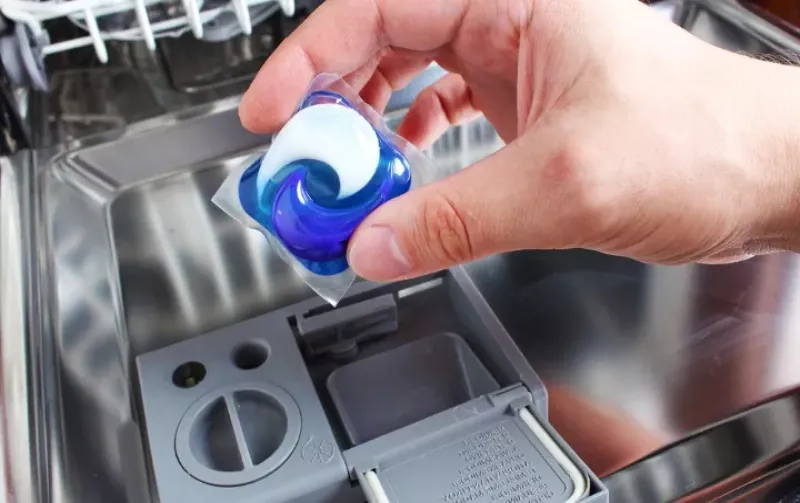Are Dishwasher Pods Bad for Septic Systems: The Truth Unveiled
We may earn affiliate fees for purchases using our links (at no additional cost to you).
Dishwasher pods can be harmful to septic systems due to their chemical composition. Many contain non-biodegradable elements that disrupt septic tank function.
Ensuring the health and longevity of your septic system requires careful consideration of the products you use.
Dishwasher pods, a convenient and popular choice for dishwashing, may pose a risk to this delicate ecosystem.
These tiny packets, though efficient for cleaning dishes, often carry chemicals and compounds that septic systems aren’t designed to handle.
The convenience of pre-measured dishwasher pods comes with a downside.
Their concentrated detergents can interfere with the natural breakdown processes within the septic tank, potentially leading to system damage or failure.
Homeowners should be mindful of the potential impact on their septic system health and consider alternatives that are safer and more environmentally friendly for their specific waste management system.

Understanding Dishwasher Pods
Dishwasher pods are convenient and pre-measured detergent packets designed for use in dishwashers.
These pods often contain a combination of cleaning agents, grease-cutting substances, and rinse aids to ensure dishes come out spotless.
Enzymes and phosphates may also be included to break down food residues and prevent water spots.
The ingredients in dishwasher pods play a crucial role in their overall impact on septic systems.
These systems rely on biological processes to break down waste, and certain chemicals present in dishwasher pods can disrupt this balance.
Pod ingredients may include surfactants, bleach, and polyacrylate polymers, some of which may not be septic-safe.
Identifying and selecting products labeled as septic-safe can help protect these delicate systems.
The packaging materials of dishwasher pods typically consist of water-soluble films, often made from polyvinyl alcohol (PVOH).
While these materials are designed to dissolve in the dishwasher, the impact on septic systems varies.
The film should biodegrade in a properly maintained septic system; nevertheless, confirming that the packaging is biodegradable and non-toxic is essential for septic health.
Impact On Septic Systems
Dishwasher pods may pose potential risks to septic systems.
These pods often contain concentrated detergents that can be slow to disintegrate, challenging the natural breakdown within septic tanks.
Non-biodegradable materials in the pods, such as polyvinyl alcohol (PVA) films, are particularly concerning.
The chemical composition of dishwasher pods sometimes includes phosphates and surfactants.
These ingredients can harm the essential bacteria in septic systems that break down waste.
Without these bacteria, septic systems can become less efficient, leading to frequent maintenance and potential system failure.
Homeowners should seek septic-safe products to minimize their impact on these systems.
| Component | Impact on Septic Systems |
|---|---|
| Detergents | Can impede the disintegration process, slowing waste breakdown |
| PVA Films | May not biodegrade easily, affecting tank functionality |
| Phosphates & Surfactants | Damaging to bacteria, crucial for waste degradation |
Solutions And Best Practices
Eco-friendly alternatives to dishwasher pods include products like biodegradable soaps and detergents that are designed to be gentle on septic systems.
Choosing these alternatives can significantly reduce the risk of septic system damage.
It’s crucial to look for septic-safe labels and certifications when selecting a dishwasher detergent.
Natural cleaning agents such as vinegar and baking soda are not only safe for septic systems but also help maintain the natural balance of beneficial bacteria.
They can be used in DIY dishwasher pod recipes or as a cleaning agent in the kitchen, contributing to a greener and safer home environment.
Proper disposal methods play a pivotal role in septic system health.
It’s important to avoid flushing non-biodegradable materials, such as plastic wrappers from dishwasher pods, down the drain.
Ensuring only septic system-compatible substances enter the system helps prevent clogs and maintains effective wastewater treatment.
Frequently Asked Questions Of Are Dishwasher Pods Bad For Septic Systems
Do Dishwasher Pods Harm Septic Systems?
Are Septic-friendly Dishwasher Pods Available?
How Do Dishwasher Pods Affect Septic Tanks?
What Ingredients In Pods Damage Septic Systems?
Conclusion
Navigating the complexities of septic system care need not be daunting.
Dishwasher pods can be used safely with proper understanding and moderation.
Opt for eco-friendly brands and consult professionals if in doubt.
Protecting your septic system sustains both your household and the environment.
Choose wisely for longevity and peace of mind.